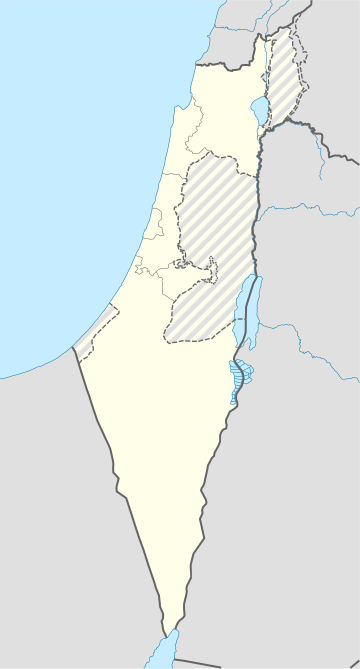Commander of Al-Qassam Brigades in Rafah Raed al Atar | |
|---|---|
 | |
| Native name | رائد العطار |
| Born | 1974 Palestine, Gaza |
| Died | 21 August 2014 (aged 39 or 40) Rafah, Gaza |
| Battles / wars | |
| Hamas biographies |
|---|
| Map: Birthplaces and family origins. |
Raed al-Atar (Arabic: رائد العطار, romanized: Ra'ed el-'Atār,[1] 1974–2014) was the commander of the Rafah company of the Hamas Izz ad-Din al-Qassam Brigades and member of the Hamas high military council. According to the Congressional Research Service analyst Jim Zanotti, his command was important due to Rafah being the destination point for the smuggling tunnels from Egypt.[2]
In 2010, al Atar reportedly held significant power and influence in the Gaza Strip, and asserted authority over the smuggling tunnels.[3][4] He was the third most senior Hamas military commander, according to Israel.[5]
In April 1995, al Atar was sentenced, following a quick trial by the Palestinian Authority court, to two years in jail for training with illegal weapons.[6][7]
On 1 February 1999 a Palestinian police captain, Rifat Joudah, was killed in Gaza a shootout with al Atar and two other members of Hamas, as he was trying to arrest them. The men sped away, running over an 8-year-old girl, Fadwa Abu Jerwana, who died from her injuries.[8] The men were subsequently arrested in the Shati refugee camp following a second exchange of fire with security forces. In April that year, al Atar was sentenced to death by the Palestinian Authority for the killing of Rifat Joudah. As soon as the death sentence was pronounced, al Atar's relatives took to the streets and stoned the Joudeh home.[9] Violent protests in Gaza resulted in two deaths.[10][11] Following the riots and criticism of the trial, Yasser Arafat met with civic leaders in Rafah and asked them to restore calm, promising to review the death sentence.[12][13]
In 2006, al Atar directed the cross-border raid in which Israeli soldier Gilad Shalit was captured. He was also present during Shalit's release from captivity during the 2011 prisoner exchange.[14][15]
During the 2009 Gaza War, al Atar fled to el-Arīsh, Sinai, along with, Mohammed Sinwar a militant who had helped coordinate the abduction of an Israeli soldier, Gilad Shalit.[16] That year, al Atar told reporters that if Israel did not accept the Hamas' demands to free 1,450 Palestinian prisoners in exchange for Shalit, Hamas would kidnap more soldiers.[4]
Reports surfaced that al Atar authorized the August 2010 firing of Grad-style rockets from the Sinai Peninsula at Eilat, Israel and Aqaba, Jordan.[2][17][18] According to Palestinian sources, al Atar authorized the attack, with the approval of the Hamas leadership abroad, including Khaled Mashal, and with the backing of Iranian intelligence agents. According to some reports, the attack took place reportedly without the knowledge of his direct commander, Ahmed Jabari,[3] while according to Egyptian officials, such an operation could not have been carried out without Jabari's approval.[19]
- ^ رائد العطار [Raed al-Atar]. www.aljazeera.net (in Aragonese). Al Jazeera Net. 29 November 2014. Retrieved 26 July 2024.
- ^ a b
 This article incorporates public domain material from Jim Zanotti. Hamas: Background and Issues for Congress (PDF). Congressional Research Service.
This article incorporates public domain material from Jim Zanotti. Hamas: Background and Issues for Congress (PDF). Congressional Research Service.
- ^ a b Anshel Pfeffer, Avi Issacharoff. "PA: Hamas Military Chief in Rafah Ordered Rocket Attacks on Eilat, Aqaba", Haaretz, 6 August 2010.
- ^ a b "Hamas threats to kidnap more Israeli soldiers". Xinhua, 28 March 2009.
- ^ "Two Hamas commanders killed in Israeli air strike in Gaza" by Mark Weiss, in Jerusalem, 22 August 2014, irishtimes.com; accessed 27 August 2014.
- ^ Palestinians Hold Quick, Secret Trials", New York Times; 3 May 1995; accessed 22 August 2014.
- ^ "Palestinian Authority alleged to run secret 'trials' lasting just a few minutes", The Baltimore Sun, 4 May 1995.
- ^ "Un policía palestino y una niña mueren en un tiroteo con militantes de Hamás", El Pais, 2 February 1999. (in Spanish)
- ^ "Death penalty fallout challenges Arafat", Laredo Morning Times, 15 March 1999.
- ^ Joel Greenberg, "Two Killed in Riots In Gaza Over Death Sentence/Palestinian court ruling causes demonstrations", New York Times, 11 March 1999.
- ^ Barzak, Ibrahim. Death sentence decision puts Arafat's judgement to the test, Associated Press via Free Lance-Star, 15 March 1999.
- ^ Khaled Amayreh. "Arafat bows to street pressure" Archived 2011-05-14 at the Wayback Machine, Ahram.org.eg; accessec 22 August 2014.
- ^ San Francisco Chronicle, p. A10, 2 February 1999; accessed 21 August 2014.
- ^ "Israeli Strikes Kill 3 Hamas Leaders as Military Wing Takes Responsibility for Kidnappings". 21 August 2014.
- ^ "Gilad Shalit and Hamas commander Raed Al-Attar". The Times of Israel.
- ^ Amos Harel. "Reservists join Gaza fighting ahead of third stage of Operation Cast Lead." January 2009.
- ^ Egypt Reveals Arrest Of Terror Squad On The Sinai. Palestine News Network
- ^ Jack Khoury. "Egypt held alleged terror squad prior to Eilat rocket attack, report says", Haaretz, 8 August 2010.
- ^ Avi Issacharoff. "Arab paper: Intel chief Diskin visited Cairo to discuss rockets", haaretz.com; accessed 27 August 2014.
